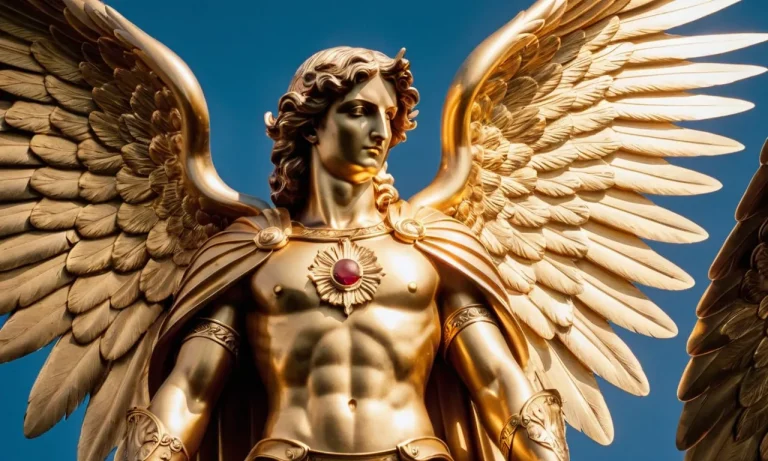Owls are mysterious birds that have captured people’s imagination for millennia. With their large, forward-facing eyes, facial disks, and feathered tufts, owls seem almost human-like. If you’re wondering about the deeper meaning and symbolism behind these intriguing birds in the Bible and Christian tradition, you’ve come to the right place.
In short, owls are most often associated with death, night, sorcery and evil in the Bible. Their nocturnal habits and silent flight linked them to darkness and the occult. Despite this, owls have also symbolized wisdom, intuition and revelation at times.
Owls in the Bible
Old Testament Depictions
Owls have an intriguing presence in the Old Testament of the Bible. While they are not explicitly mentioned by name, there are references to birds of prey and creatures of the night that are believed to represent owls. In the Book of Isaiah, for example, it mentions a desolate place where owls dwell, emphasizing their association with desolation and darkness.
Another interesting reference is found in the Book of Leviticus, where certain birds, including owls, are listed as unclean animals. This classification suggests that owls were viewed negatively and were considered impure or unholy in ancient Hebrew culture.
New Testament References
In contrast to the negative connotations in the Old Testament, the New Testament offers a more positive portrayal of owls. In the Gospel of Luke, Jesus mentions how God cares for the sparrows and assures his followers that they are of much greater value than many sparrows. This reference indirectly highlights the significance of all birds, including owls, as part of God’s creation.
Furthermore, there are no specific negative mentions of owls in the New Testament, which can be interpreted as a shift in perception. It is possible that owls were no longer seen as impure or associated with darkness, but rather as creatures worth appreciating and protecting.
It is important to note that the symbolic meaning of owls in the Bible can be subjective and open to interpretation. Different scholars and religious groups may have varying perspectives on the significance of owls based on their own cultural and theological backgrounds.
Negative Symbolism of Owls in Christianity
While owls are fascinating creatures with a rich symbolism in various cultures, they have often been associated with negative connotations in Christianity. Let’s explore some of these negative symbolisms:
Associations with Death and the Demonic
One of the reasons owls have a negative symbolism in Christianity is their association with death. In the Bible, owls are mentioned in several verses that depict desolation and destruction. For instance, the book of Isaiah describes a desolate land where owls will dwell and screech in the ruins (Isaiah 34:11). This imagery creates a somber and eerie atmosphere, emphasizing the consequences of turning away from God’s path.
Furthermore, owls are often linked to the demonic realm in Christian folklore. In medieval Christian art, the owl was sometimes depicted as an accomplice of witches and sorcerers, representing their connection with the occult and supernatural forces. These depictions reinforced the belief that owls were associated with evil and darkness.
Representing Deception and Occult Knowledge
Another negative symbolism attributed to owls in Christianity is their association with deception and occult knowledge. This perception stems from the owl’s nocturnal nature, its ability to silently glide through the darkness, and its piercing gaze. These attributes have led to the belief that owls possess hidden knowledge and can see through deception.
In some Christian interpretations, this association with occult knowledge is seen as a warning against seeking wisdom and guidance from sources outside of God’s teachings. It serves as a reminder to remain cautious and discerning when encountering knowledge that may lead one astray from the path of righteousness.
It is important to note that these negative symbolisms of owls in Christianity are based on cultural interpretations and beliefs. Different Christian denominations may have varying perspectives on the symbolism of owls. It is always advisable to seek guidance from trusted religious authorities for a more comprehensive understanding.
Positive Meanings of Owls
Wisdom and Observation
One of the most prominent positive meanings associated with owls is wisdom. In many cultures, owls are seen as symbols of wisdom and knowledge. This symbolism can be traced back to ancient times, where owls were often associated with the Greek goddess Athena, who was the goddess of wisdom. According to mythology, Athena had an owl as her companion, which further solidified the connection between owls and wisdom.
Owls are known for their keen observation skills and ability to see in the dark. Their large eyes and exceptional vision allow them to navigate through darkness with ease. This ability has led to the belief that owls possess a deep understanding of the world and have the ability to see beyond what is apparent to others. As a result, owls are often seen as wise creatures who can provide guidance and insight.
Intuition and Insight
In addition to wisdom, owls are also associated with intuition and insight. Their ability to silently fly through the night and hunt their prey with precision has long fascinated humans. This stealth and agility have given owls a mysterious and almost mystical reputation.
Many people believe that owls have a heightened sense of intuition and can see beyond the surface level of things. This belief is often tied to their ability to navigate through darkness and their keen observation skills. Owls are seen as creatures that can perceive hidden truths and provide guidance in times of uncertainty.
It is important to note that the symbolic meanings of owls can vary across different cultures and belief systems. While these positive associations are widely accepted, it is always interesting to explore the diverse interpretations and meanings that different cultures attribute to owls.
Owls in Christian Art and Literature
Owls have long held a significant place in Christian art and literature, often symbolizing various spiritual concepts. Throughout history, artists and writers have utilized the owl’s unique characteristics and attributes to convey deeper meanings and messages. Let’s explore how owls have been depicted in different periods and genres of Christian creativity.
Depictions in Medieval Bestiaries
In medieval bestiaries, which were illustrated compendiums of animals, owls were often portrayed as symbols of darkness and evil. Their nocturnal nature and eerie hooting made them associated with the devil and witchcraft. However, some bestiaries also acknowledged the owl’s wisdom and keen vision, attributing these qualities to the divine guidance of God. These conflicting interpretations reflect the complex nature of owls and their symbolic significance.
Representations in Renaissance Painting
In Renaissance painting, owls took on a more nuanced symbolism. They were frequently depicted alongside religious figures, such as saints or the Virgin Mary, to represent watchfulness and vigilance. The owl’s ability to see in the dark was seen as a metaphor for spiritual insight and discernment. Artists used owls as visual reminders to remain alert and attentive to God’s presence in daily life.
Owl Imagery in Modern Christian Fiction
In modern Christian fiction, owls continue to play a role in conveying symbolic meanings. Authors often use owl imagery to represent themes of wisdom, guidance, and spiritual awakening. For example, in the popular novel “The Shack” by William P. Young, an owl appears as a wise and compassionate character who imparts important lessons to the protagonist. Such representations serve to inspire readers and encourage a deeper connection with their faith.
Exploring the biblical meaning and symbolism of owls in Christian art and literature provides a fascinating glimpse into the rich tapestry of religious creativity. It reminds us of the power of symbolism and how it can deepen our understanding of spiritual concepts. Whether seen as creatures of darkness or messengers of wisdom, owls continue to captivate the imagination and provoke contemplation within the context of Christianity.
Conclusion
While often portrayed negatively, owls have also symbolized wisdom and discernment at times in the Bible and broader Christian tradition. Their nighttime habits linked them to the underworld and all things occult, but their intelligent gaze also suggested inner insight. Whatever their meaning, owls continue to fascinate us with their mix of mystery, magic and intelligence.






